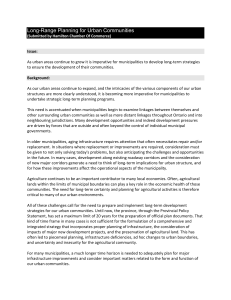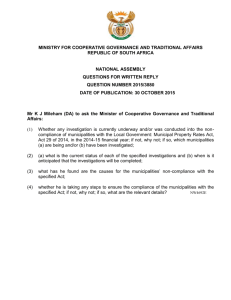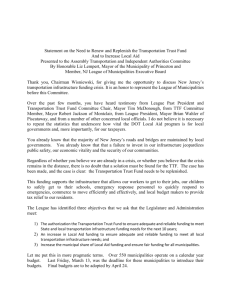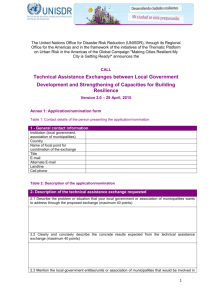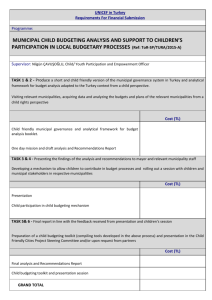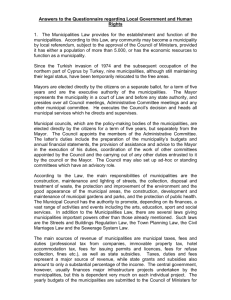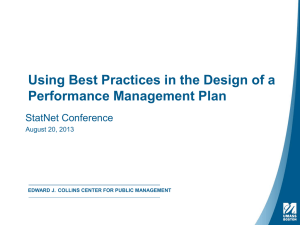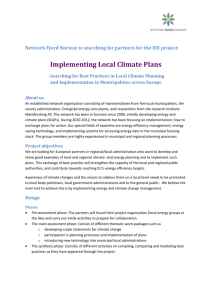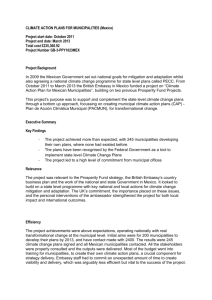Speech by Cooperative Governance and Traditional Affairs MEC
advertisement
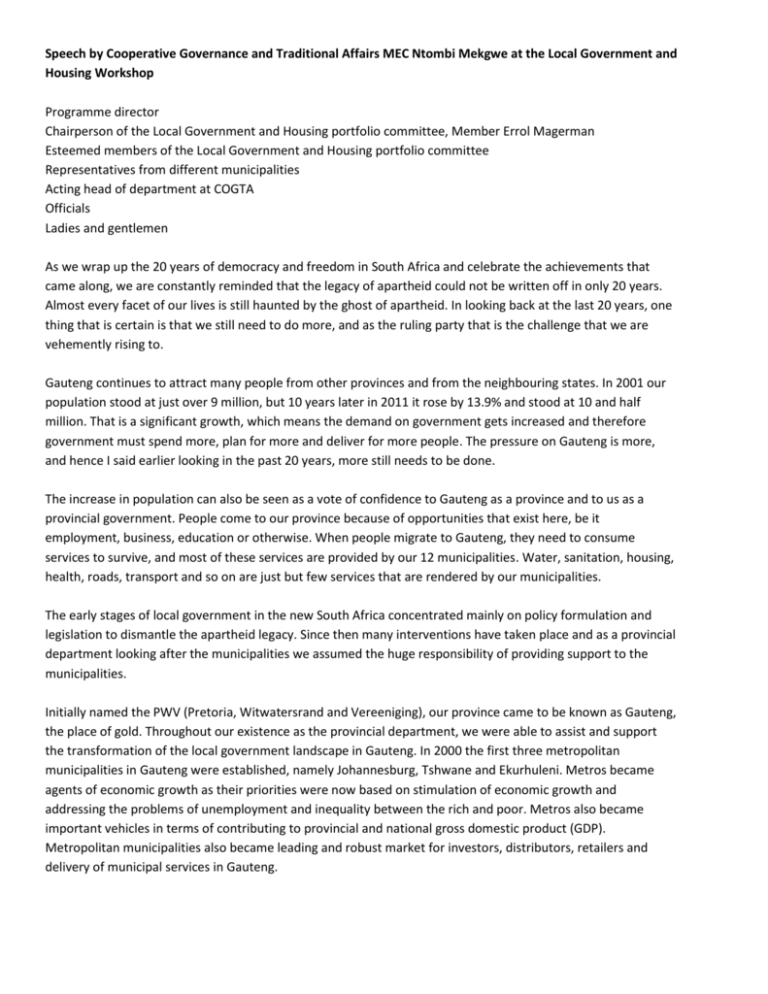
Speech by Cooperative Governance and Traditional Affairs MEC Ntombi Mekgwe at the Local Government and Housing Workshop Programme director Chairperson of the Local Government and Housing portfolio committee, Member Errol Magerman Esteemed members of the Local Government and Housing portfolio committee Representatives from different municipalities Acting head of department at COGTA Officials Ladies and gentlemen As we wrap up the 20 years of democracy and freedom in South Africa and celebrate the achievements that came along, we are constantly reminded that the legacy of apartheid could not be written off in only 20 years. Almost every facet of our lives is still haunted by the ghost of apartheid. In looking back at the last 20 years, one thing that is certain is that we still need to do more, and as the ruling party that is the challenge that we are vehemently rising to. Gauteng continues to attract many people from other provinces and from the neighbouring states. In 2001 our population stood at just over 9 million, but 10 years later in 2011 it rose by 13.9% and stood at 10 and half million. That is a significant growth, which means the demand on government gets increased and therefore government must spend more, plan for more and deliver for more people. The pressure on Gauteng is more, and hence I said earlier looking in the past 20 years, more still needs to be done. The increase in population can also be seen as a vote of confidence to Gauteng as a province and to us as a provincial government. People come to our province because of opportunities that exist here, be it employment, business, education or otherwise. When people migrate to Gauteng, they need to consume services to survive, and most of these services are provided by our 12 municipalities. Water, sanitation, housing, health, roads, transport and so on are just but few services that are rendered by our municipalities. The early stages of local government in the new South Africa concentrated mainly on policy formulation and legislation to dismantle the apartheid legacy. Since then many interventions have taken place and as a provincial department looking after the municipalities we assumed the huge responsibility of providing support to the municipalities. Initially named the PWV (Pretoria, Witwatersrand and Vereeniging), our province came to be known as Gauteng, the place of gold. Throughout our existence as the provincial department, we were able to assist and support the transformation of the local government landscape in Gauteng. In 2000 the first three metropolitan municipalities in Gauteng were established, namely Johannesburg, Tshwane and Ekurhuleni. Metros became agents of economic growth as their priorities were now based on stimulation of economic growth and addressing the problems of unemployment and inequality between the rich and poor. Metros also became important vehicles in terms of contributing to provincial and national gross domestic product (GDP). Metropolitan municipalities also became leading and robust market for investors, distributors, retailers and delivery of municipal services in Gauteng. The re-configuration of municipalities also resulted in the three districts, namely Sedibeng, West Rand and Metsweding. The Metsweding district was subsequently done away with, and was incorporated into Tshwane, making Tshwane the 3rd largest city in the world after New York and Tokyo. The main idea for reconfiguring municipalities in Gauteng was to make sure that they deliver faster and operate optimally. However, for municipalities to deliver on their constitutional mandate, stable institutional structures needed to be in place. Such structures needed to be accompanied by appointed personnel with the required skills and competences, first at a senior management level and then in all other levels below. Human resources of a municipality and the skills their personnel bring to the workplace are critical inputs in the delivery of all services as required of a municipality. All municipalities have approved organisational structures in place. Municipal finance support is one the key interventions that is central in assisting municipalities to function better. This intervention manifests in various programmes, one of which is Operation Clean Audits. Operation Clean Audit (OPCA) targeted support to the disclaimed and qualified Municipalities in order to improve the outcomes of the AG Audit. The OPCA Targeted Support is a hands on support project focusing on assisting municipalities that received disclaimers and qualifications in their audit opinions. What OPCA does is to identify and focus on areas which require critical support in each municipality. Hands-on assistance and resources were then deployed to the municipalities. The Department is also assisting municipalities by implementing the Revenue Enhancement and Debtor Management Program. These are attempts by the department to make sure that municipalities are able to collect monies that are due to them. The Program has three broad objectives namely: • Debt reduction; • Billing integrity; and • Revenue collection improvement The Gauteng Department of Cooperative Governance (GDCoGTA) and the Gauteng Department of Finance (GDF) have embarked on a project to ensure that Gauteng municipalities are paid for the services that they render to the Gauteng Provincial Departments. We are seeing progress with this programme as more and more government departments are starting to service their debts to the municipalities. The strategy has three key objectives: • To establish a method for the payment of arrears to municipalities owed by various government departments both nationally and provincially. • To ensure that debtor information on government accounts is cleaned and corrected on the municipal finance systems. • To facilitate regular payment into the future for municipal services rendered. Since 2007 the Department has undertaken rigorous intergovernmental initiatives to facilitate alignment of Integrated Development Plans to National and Provincial (IDPs) priorities. Through the department’s hand-onsupport, municipalities are now developing IDPs in-house. Since 2009 the department also undertook rigorous IDP education programmes to assist various stakeholders to identify their role and contribution in the IDP process in order to enhance participatory democracy. State of Municipal Finances assessment was undertaken in 2007 which resulted in the development of the Municipal and Provincial Action Plan of Action. The Department, in conjunction National COGTA, undertook a Diagnostic Analysis in 2010 and developed the Local Government Turn Around Strategies. As part of continuous improvement, the department is currently undertaking a Municipal Viability study which will result in the development of the Municipal specific and Provincial wide Viability strategies and implementation plans. Some of the interventions by our department include the following; • Monitoring and supporting municipalities with the spending of MIG and other key infrastructure grants. • Support in the development of the Water Conservation and Water Demand Management Plans and Programmes • Monitor and support municipalities in the refurbishment and upgrades of Waste-Water Treatment Works to improve bulk capacity. • During the period 2000/4 the department facilitated the finalisation of organisational structures and equity plans in the following municipalities (Westonaria, City of Tshwane Metropolitan, Merafong, Lesedi, Nokeng Tsa Taemane) • In 2008/9 The Department developed a provincial HR framework, strategy and guidelines (piloted in Emfuleni for implementation in municipalities) • Development and implementation of performance management systems in all municipalities, which enabled the municipalities to compile their annual reports as required by Municipal Systems Act, was developed. • Development of Business Continuity Plans for all municipalities – 2009/2010 One of the key responsibilities of our department is to assist municipalities in increasing quality and access to basic services. As at 2011, 98.2 % or just 4 million households in Gauteng had access to piped water. Refuse removal by municipalities stood at 89.8%. Access sanitation increased to 86.5%, while access to electricity stood at 87.4%. All municipalities are providing free basic water (FBW) and free basic electricity (FBE). The department also monitored and assisted municipalities in installing solar geysers, and to date a total of 66336 geysers have been installed across the province. In order to assist the poor and the needy to enjoy access to services, all municipalities approved their own indigent policies. One of the top priorities of our government post 1994 was to invest in infrastructure development in order to improve the quality of lives for all South Africans. Different funding models such as Municipal Infrastructure Grant (MIG), Human Settlements Development Grant (HSDG), Urban Settlements Development Grant (USDG) and so on were established. However there exists a problem of co-ordination when these grants are used by the province and municipalities, particularly with regards to USDG and HSDG. All too often we miss the opportunity to work smarter and deliver more on our mandate. As we engage in these two days, let us find ways of integrating our planning and co-ordinating our work to maximise on the output and its associated quality. Much can be achieved with these two grants. As a department we have also assisted municipalities in enhancing participatory democracy. Today all municipalities have ward committees, an achievement that makes sure that ordinary citizens play a meaningful role in the running of local government. On the other side, we have also assisted in the launch of Municipal Public Accounts Committees (MPACs). This is an oversight role that will ensure transparency and clean governance. Our work as a department could have not been done properly had it not been the oversight and watchdog role of the portfolio committee on local government and housing. You have kept the department on its toes, but for all the good reasons. At the same time my department has enjoyed the support and guidance from the portfolio committee. It is my firm belief that we must strengthen our working relationship in order to improve the service that we render to our people. I am looking forward to robust engagements here at the workshop, and I hope all the outcomes will guide us to what we must do in order to strengthen and improve our work towards our people. I thank you.
